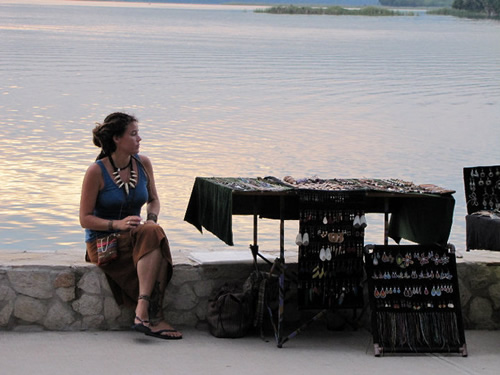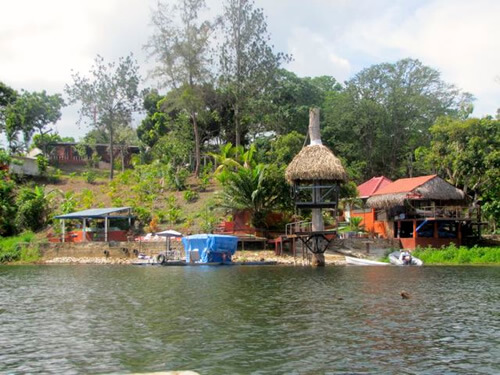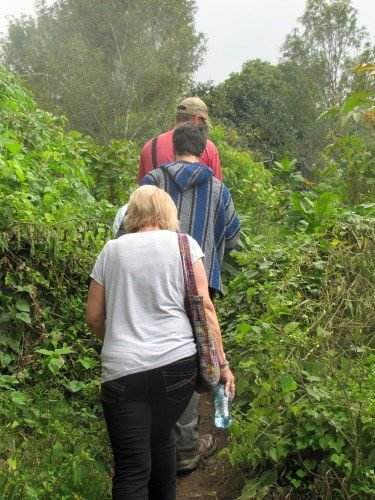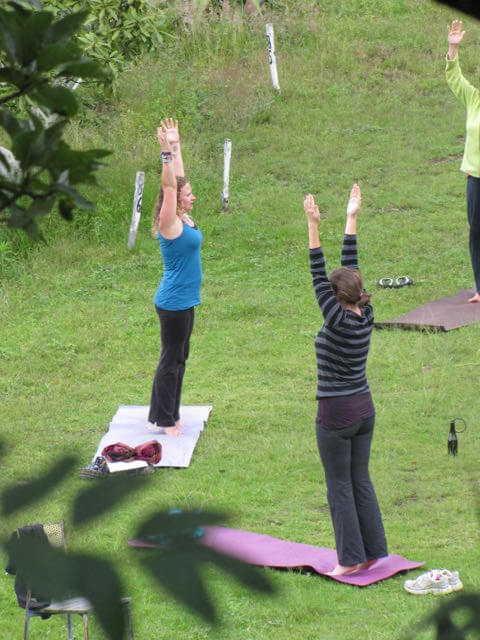Top Jobs Abroad for Creative Long-Term Travelers
How to Find Paid Work Abroad to Extend Your Journey
Article and photos by Jonathon
Engels
Published 2/22/2015, resources updated 8/5/2023 by Transitions Abroad

|
|
A volunteer in Guatemala.
|
You've reached the end of an epic journey or, as
sometimes happens to long-term travelers such as myself,
grown weary of constant travel and want to settle down for a while. You don't want to hang up the backpack for good, but stuff it under a bed for now. You'd love to find a job that'll keep you above water conserve funds until you're renewed and ready to continue, something that'll last a month or six in a place that isn't "back home" but feels like home. Fear not. Options abound.
As in any job market, the more qualifications you have going for you, the more opportunities will be at your disposal. Luckily, many of these qualifications are relatively easy to pick up before you leave or while abroad and can be part of your traveling adventures. What's more, considering the types of jobs we are about to explore, it's important to remember that pay isn't so much an issue as just keeping yourself overseas — working to break even while continuing your journeys.
Have you ever considered being…?
Have you ever considered being…?
An Artisan: If you like to make stuff, this is a perfect way to earn a little cash anywhere on your travels. Some artisans take a solemn approach, setting up carpets or stalls at popular tourism spots selling skillfully constructed crafts, like macramé bracelets, metal jewelry, or crocheted beanies. With a few sales, there's money to supplement your funds and allow you to linger until you've saved enough to move on to your next desired destination. Often, the job is as simple as selling to folks you meet in the hostel for some bonus cash. Make something in the common area; someone will always ask about it. Then, you're nine-tenths on your way to a sale.
-
Be respectful of local
merchants and artisans by not duplicating something they do for a living. Remember, making handicrafts is often their sole livelihood, whereas your crafts may be a means to travel longer. Optionally, if you are having success, be creative and generous; teach some locals how to make your products and learn to make theirs. That's a genuine cultural exchange.

|
|
A visiting artisan in Flores,
Guatemala.
|
An Au Pair: Not everyone is down with childcare, but if kids are your thing, it's good to know that there is a need for your skills and patience all over the planet. Anywhere there are kids, you'll find parents needing a bit of relief, and they are looking
for au pairs. Traditionally, women have taken these jobs, but that is very slowly changing. Arrangements often include housing with varying degrees of responsibility, which can be as simple as looking after the kids. At the same time, parents are at work to provide full-service home care. Because learning English is so critical to many abroad these days, more and more families are looking for au pairs who speak the language natively.
-
Families are different, as are cultures, so be prepared to make necessary adjustments. Living with a local family is one of the most profound cultural immersion experiences and a great way to improve your language skills.

|
|
Overlooking Florence, where she
enjoyed her work and life as an au pair. Photo by Janine
Sobeck.
|
A Bartender: Being a bartender can be hard work, especially during "happy hour," but doing so abroad offers unique splendor. It's an easy-going way to live, with days open to explore (or even time to do some good in the community), and nights for partying with other travelers. Everyone loves the bartender, so it's an easy way to land your pick of friends, including locals and expats, who can make you privy to cool inside information. The challenge is not becoming a complete bum and trading in that sense of wonderment, adventure, and idealism for too many cocktails every night.
-
Choosing a place that hires locals for most of the jobs is good. English-speaking bartenders are necessary in tourist haunts, but you don't want to work for a business that doesn't provide jobs for natives. Local colleagues will also enrich your experience.

|
|
A bartender.
|
A “Chef”: Lots of hostels and guest houses offer simple fare for travelers, and they are often on the lookout for competent cooks who can cater to Western palates (even if you, personally, are after local foods). These jobs often don't require any formal training. They usually don't mean understanding the intricacies of a beurre blanc, or which knife to use for a given dish. If you are a decent cook who can turn out good burgers, pasta, and burritos, you have a great shot in many parts of the world.
-
Central America is fantastic for this sort of gig. Many hostels host family-style dinners, with all guests sitting together to enjoy the same meal, often prepared by creative expat cooks. In contrast, standard breakfast and lunch fare is prepared by locals. Contact hostels directly through the many online hostel websites or use a forum
for hostels jobs to gain inside advice.
A Dive Guide/Instructor:
Granted, only some people are qualified to do this, but that's not to say you can quickly become so. If scuba diving interests you — which is the case for many travelers — then you should already know you aren't that far off from being a qualified professional
dive instructor. The qualifications may require upfront costs depending on the certificate you seek. Still, where there are beautiful beaches, there are generally dive shops looking for instructors. And that's not a bad spot to stop for a while. What's more, with this qualification/certification in hand, you can find work all over the world.
-
Remember to look into working as a diver in lakes as well. While ocean diving may be more vibrant, lakes offer unique experiences for divers, and they have fewer applicants than tropical beach towns..

|
|
The author as a diver in the
Philippines.
|
An English Teacher:
With only a quick qualification under your belt (sometimes not even that), it's possible to find
work teaching English around the world. Literally, from Korea to Colombia, Russia to Chile, people of all ages seek to learn English, and the consensus seems to be that native English speakers are the best people to show them the way. You generally earn an above-average salary, adjusted for the local standard of living, and often get assistance procuring a long-term visa if you wish to stay.
-
Do you lack qualifications working as a teacher before your travels? No problem, as long as you have a college degree. Certification courses are offered in just as many places as English teachers are in demand. Most take about a month to complete, often just the right time to hang out at a location. Editor's
note: Online
certifications are also readily available, though
contacts you make at schools abroad often lead to
job placements more readily.
-
Yet another excellent option is to teach English online using Skype or Google Meet in a location-independent manner, as described in courses such as “The Ultimate Guide to Teaching English Online.”

|
|
Teaching English to Hugo in Brazil.
Photo by John
Clites.
|
A Farmhand: Farm work can be paid or volunteer, depending on location. Generally, paid jobs are typical during intense harvesting seasons involving long hours and lots of work with a quick monetary reward. Volunteers put in a few hours a day performing various odd jobs in exchange for room and board, and there is plenty of time off to explore the area, relax, or pursue other interests. Suppose you can go without partying or booze. In that case, it's possible to live
long-term doing farm work for months at virtually no
financial cost.
-
Either way, if you decide to work, it's unusual for any prior experience to be necessary. However, skilled people often find themselves viewed more favorably. It's also much more demanding physical work than most beginners expect. Regardless, the
option to work on a farm is available across the
globe via WWOOF and other organizations.

|
|
Farmhands in a permaculture jungle.
|
A Freelance Writer:Now that most publications have moved online and Wi-Fi can be found in jungle huts worldwide, it's possible to write from just about anywhere. Breaking
into the travel writing scene an take a little time, but it can be a great way to provide yourself with enough income to help finance your travels. Bloggers make money by selling ad space on their sites or by promoting products, and there is hard-won cash to be earned by writing travel articles for other blogs or sites.
-
The inclination for long-term travelers to write about travel because that is what you are doing and is likely your passion, but remember that you can write about anything. You may also write in a variety of genres with little competition that may pay more and relate to other personal interests or expertise.

|
|
Some of the tools of the trade
for a freelance (travel) blogger.
|
A House-Sitter: Especially
if you are handy, house-sitting s a great option for taking extended stays worldwide. These arrangements are usually a money-free trade: gratis lodging for looking after someone's home. But, there are more complex situations in which house-sitters
may earn an income by running someone’s guest house.
by running someone's guest house. You may do home improvement projects, caring for a pet, or maintaining a farm for a while. Once you prove yourself reliable, there are lots of opportunities.
-
Each job is different, including who pays the bills, how guests are handled, the freedom to travel short-term, etc., so establish all the ground rules from the get-go.

|
|
A house-sitting job has its unique
perks, including living in places like the one pictured
above.
|
An Interpreter: Many travelers go to places to practice their language skills, and if yours are strong enough, you may find
work as an interpreter. An interpreter handles verbal communication, unlike translators who deal with the written word and often require quite a bit more in the way of qualifications. The ability to interpret for people can land you gigs with tour agencies, hotels, and fellow travelers looking for guidance during their stays.
-
Being an interpreter
doesn’t require you to be perfectly fluent (though that does not hurt). Still, it requires that you are capable of communicating effectively in the languages concerned without needing outside sources (dictionaries) to translate.

|
|
Tour guides must often also act
as interpreters.
|
A Masseuse: Granted,
this is a job that requires some training beforehand, but
if you’ve got the skills, there is work as a massage therapist to be had on land and sea. Hostels and guest houses are often quite accommodating to folks who want to offer these services to their guests. Get some business cards or print a flyer and promote yourself around town on whatever bulletin boards you can find. This goes for reiki and other healing therapies. People love this sort of stuff on vacation.
-
Look for hotspots for
yoga, adventure travel, cruise ships, and the like; generally, you will find a steady flow of customers wanting these services. Give restaurant and hotel owners a freebie, get some recommendations, and you are ready for work.
A Musician: Depending upon your location, the competition for English-language singers can be pretty slim, which means confidence and hustle are just as important as talent. Use the open mic night to land some gigs at local bars, restaurants, and hostels or anywhere you notice live music is popular. A few weekly spots keep you in money, dutifully occupied, and connected to the local scene. If you are not a professional musician by trade, settle in small cities along the travel trails.
-
You must be competent on an instrument that travels well and supports singing a tune. There are, sadly, only a few gigs for instrumentalists abroad.

|
|
Working as a talented musician and in the right place can earn enough cash to keep you going. |
A Sailor: Okay, let's be honest, this terminology sounds more official than vagabond, but isn't it fun to carry the title? The truth is that cruise
ships (and private boat owners) are constantly looking for
crew members. While this may mean long hours and days at sea, it also comes with much adventuring and promises many stories. Cruise ships always look for employees, and some of the work is seasonal. Still, a lot must be had, including cabin crew, cleaners, entertainment, deckhands, chefs, etc..
A Seasonal Worker: Seasonal
work is not for the faint of heart. Like (and including) seasonal farming, it tends to be more laborious than fun but also yields a rewarding chunk of change for more traveling afterward. Plus, something must be said about the relationships developed in these intense situations and the opportunities that often become available.
For example, a
ski instructor in Colorado can easily instruct folks
almost anywhere.
-
Seasonal work offers
a wide range of options — everything
from working on oil rigs to leading groups down
springtime rapids to crewing on a fishing boat.
Such jobs are also a great way to learn or become
more proficient in your interests.

|
|
A job in ski instruction can
be found in many locations.
|
A Travel Guide: This
is perfect
for travelers who fall in love with a place, are passionate about it, and learn (or want to learn) all they can (or even just some specific aspect). Some tours focus on just about everything — graffiti, religion, architecture, food, volcanoes, etc. — and tourists desperate to do it all. Find tour companies looking for a hand, or get in cahoots with a local eatery or hostel and develop something special to fill a need.
-
We presume in this piece that you are still abroad and looking for work. However, if you've gone home and still have the itch, there is also lots of work guiding
vacations from start to finish.

|
|
Prolific Beth
Whitman leads tours in Bhutan, India, New Guinea,
Southeast Asia, and many other locations, working
as a guide, a publisher, a blogger, and much more.
|
A Volunteer: One common
misconception about full-time volunteers is that they have
to foot the bill for their work. While the work required
for any pay received is usually not on par, volunteers who
take on long-term posts (think six months or more) sometimes
get a stipend to cover their costs. Of course, the other
benefits of taking on this kind of job — learning
from locals, trying to improve their lives, and gaining
a deeper understanding of a place — are the true reward.
-
Volunteering doesn't have to be a long commitment with a big organization like the Peace Corps. Still, it can also serve one of the thousands of grassroots NGOs looking for international volunteers.
A Yoga Instructor:
Obviously, some flexibility (quite literally) is needed for this work. Credentials may also be necessary depending on where you wish to practice, but yoga
instructors are in demand. Options can include startup yoga studios in a tourist destination, sacred mountain training facilities, or established big-city businesses. In addition, plenty of confident yogis set up at obliging hostels looking for more amenities to offer guests. And, credentialed or not, many find work.
-
Being a certified instructor, while not necessary, obviously does not hurt, and this can be accomplished abroad, generally near places where yoga teachers are in demand.

|
|
Teaching yoga abroad.
|

|
Jonathon
Engels earned an MFA in creative writing.
He has lived, worked and/or volunteered in seven
different countries, traveling his way through
nearly 40 countries between them. His many interests include permaculture, veganism, and ways to live sustainably.
|
|
